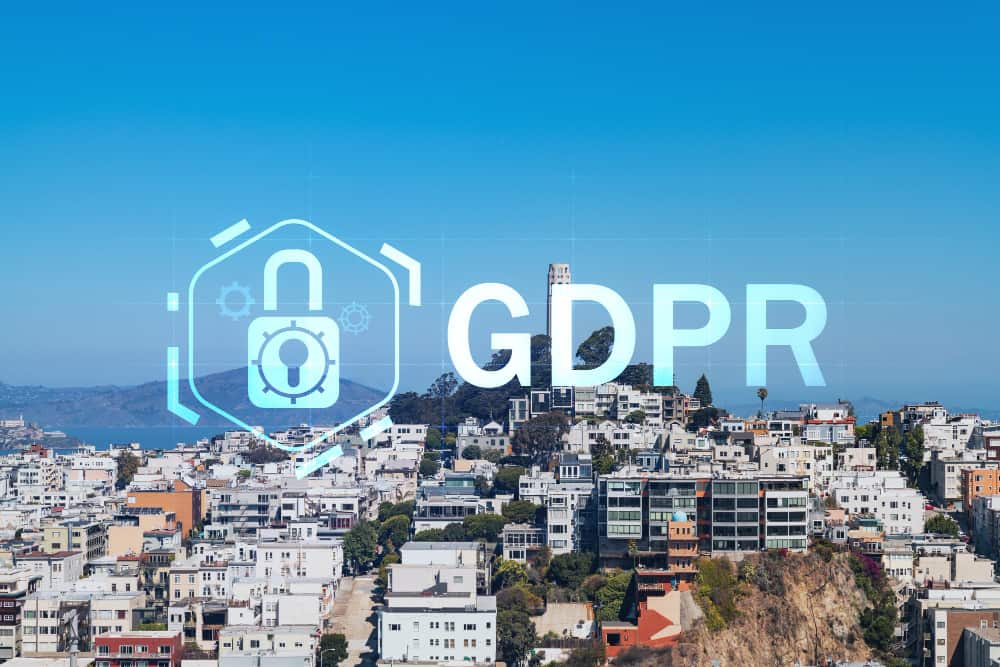- Introduction
- Where do Privacy laws Originate? Issues Leading to Create This Concept
- What are the Issues Related to Privacy?
- What are the Different Types of Private Information Protected Under Privacy Law?
- GDPR, The Main Instrument Helping to Protect Private Data
- Data Privacy Trends that Digital Businesses Need to Follow
- What Does a Privacy Lawyer Do?
- What are the Opportunities for Lawyers in Privacy and Data Protection?
- How Do Lawyers Contribute to Privacy Law?
- Conclusion
Introduction
Privacy law is an area of law that contains a collection of laws and regulations relating to the collecting, keeping, and use of personal information. Almost anyone has experienced giving information to governmental or private entities when they want to get a license, purchase something, ask for an online appointment with a doctor, post on our social media, and so on. Now, what will happen to our information? Are these entities free to use as they wish?
The straight answer is NO! Of course, they are not allowed to do so. It is the point that we can see how privacy laws play a role. It clarifies the limitations of the mentioned centers regarding using the information. By privacy law, it is clear that data and info are stored and defined in a secure method. This law is applicable at both local and international levels. For example, suppose there is an international transaction. In that case, the privacy law of the foreign state will apply to the local entities. The most famous case is about Amazon in the EU.
The next question is about the importance of data privacy law. Why is it important? First, personal information should be handled carefully, and organizations face a variety of privacy risks. For instance, hackers can commit various cyber-crimes if they access personal data, from identity theft to stealing millions of dollars.
It is just a little risk! What do you think about the governmental level? Have you ever thought about risking a nation’s security?
Data protection regulations give some ideologies and norms to businesses and governmental entities that stop them from putting stored data at risk. In these norms, they can specify the duration, the way of use and protection, and even the forwarding regions of the stored data. The world is changing day by day and even hour by hour! Online data are growing faster, so we need more and more protection for this information.
Where do Privacy laws Originate? Issues Leading to Create This Concept

The invention of the phonograph by Edison and the Kodak camera by George Eastman shocked the whole new world. However, also, some began to question the use of these new devices because they firmly believed that it was somehow a breach of privacy. Although, in 1980, Samuel Warren and Louis Brandeis published an article called “The Right to Privacy” in the Harvard Law review, privacy law officially started with The Freedom of Information Act (FOIA) in the United States.
The next state is Sweden, which entered into this with the first federal privacy law in 1973, passing the Data Act, which criminalized data theft. Germany was the next, with the German Federal Data Protection Act in 1978. But the most important regulation is GDPR, which we will discuss in this article specifically! So it is better not to say any other word until the time comes! Wrap up the history, and let’s look at an important topic that leads us to privacy law and reminds us of its value!
What are the Issues Related to Privacy?

To better understand the privacy law, it is better to be aware of some privacy issues; as a lawyer or a user, you should know what could be the possible issues. Let’s have a look at four essential ones:
Access control is difficult in many industries: poorly managed access within a business or an organization is one of the most important reasons for data privacy breaches!
The growing development of the internet mandates businesses to upgrade their privacy standards, which makes it even more important to consult a professional lawyer(Top secret! In case you are searching for a data privacy lawyer, we can assist you via our LegaMart directory) about contracts, confidentiality clauses, and data sharing clauses to understand potential risks and advantages associated with working with the latest privacy strategies.
The increasing scale of data: As was mentioned before, data is increasing daily, and managing this vast data is just like trying to save a little boat in a stormy ocean!
A long list of regulations to follow: I know! It is bewildering, and you cannot think of the right data privacy level for your different information. It is a big bug!
Increasing data-keeping costs: Everything costs money, even water! So it is pretty fair to be worried about the data privacy maintenance cost! Keeping your data secure is expensive, but please consider that breaching data privacy can be more costly, and the consequences may be severe!
Now, we know what data privacy law is, why it is essential, and the issues that lead us to use the laws and regulations to secure them. It is time to get to know the types of private information.
What are the Different Types of Private Information Protected Under Privacy Law?

Being a customer or a business owner, you must know that businesses have legal obligations about using, collecting, and sharing personal information. But let’s see what the different types of personal information are. By the way, do not forget that these are just some examples and not all of them:
1. Contact Detail: The type of information you generally use to get in touch with someone: Name, Last Name, address, email, phone number.
2. ID Numbers: social security number (US), national insurance number (UK), passport number, taxpayer identification number, and so on. It should be noted that not every ID number is personal information.
3. Encrypted data: financial details like bank account number, credit card number etc.
4. Specific Category Data: Health, race, sexual relationships, political point of view, genetics, etc.
These are just a few examples and could vary in privacy laws and jurisdictions.
GDPR, The Main Instrument Helping to Protect Private Data

GDPR is the European Union’s core data privacy legislation. General Data Protection Regulation is the most comprehensive and vital data privacy rule until now! No exaggeration! It seriously bolds accountability, consent, and security. Facebook’s $3.5 million fine is one of the most famous cases imposed under this law. But don’t be scared! GDPR is not just for fines and punishment! Its advantages are more than horror! Now let’s see what some critical benefits of GDPR for businesses are.
According to the GDPR, every business must prove that the necessary framework is in place to protect personal data. By GDPR compliance, you show your customer that your organization is a great data trustee.
It gives better data security; According to GDPR, only a few professionals have access to the critical data in each organization to ensure that it is not accessible to everyone. Furthermore, every organization must disclose any breach within 72 hours of its occurrence.
The other benefit is reduced keeping costs; we mentioned that keeping the data costs too much, But GDPR is the solution to this issue! How? According to GDPR, it is mandatory to keep data up to date and to do so. You can incorporate stored data in inconsistent formats and cut maintenance costs.
Better decision-making; according to GDPR, it is no longer allowed to make automated decisions in organizations according to private data because there could be too many errors in this type of decision. Hence, GDPR mandates the right to get human involvement.
Now we want to talk about another important topic of privacy law. However, some small businesses might prefer using websites or packages for privacy regulations and self-compliance. We should not underestimate the role of privacy lawyers. Furthermore, not everyone can defend themselves against privacy data breaches, and here is the spot where we need data privacy lawyers.
Data Privacy Trends that Digital Businesses Need to Follow
Now that we know about the importance of data privacy importance and its issues, it is time to learn more about its trendy topics. If you are going to start a startup or any online business, or if you should consult the businesses, it is crucial to know about the trendy topics and issues; Let us have a look at three of them:
First of all, it is essential to know that privacy is a service solution, and it grows daily! When people want to enter an approach to a company, they have no idea how they should file a GDPR or how to address it, and this is the reason for using AI to protect their data by emerging many tools. It might be hard to believe, but it goes the same for companies! Given that they enable you to respond to data privacy requests on a large scale, privacy platforms are now essential to the expansion and success of your organization.
With no human involvement, these privacy platforms have developed to automatically handle the entire fulfillment process (and at risk of human errors). Sometimes, these platforms are set up with no-code solutions. Now how to use this trend for your business? Well, a Privacy as a service solution is the way. Use it!
The next thing essential to know is that digital footprints are everywhere! The digital footprint is expanding steadily for both businesses and people. Businesses that do not keep track of where they retain users’ private information will find it challenging to map everything in the future.
Maintaining a small digital footprint will become increasingly important for individuals and businesses in 2022 as data breaches continue to make news. Now what?! Well, please consider that when was the last time you planned all data sources in your company?! If it was more than one year ago, you should know that it is a grave danger to your company!
Fortunately, today’s technologies can substitute an autonomous and easy process for endless interviews with your personnel. You may get a precise picture of your company’s digital footprint by scanning the services the company’s employees have joined up for and sending the users’ data.
Last but not least is the consumers; today, they demand more control over their data.
In 2022 and beyond, consumers will ask for more reasonable data privacy practices. They do not care if there is no law to get support; when it comes to their data, customers will choose to work with open and responsive businesses. So do something to build this trust for your customers. Even if no law mandates it, make it simple for your consumers to access or erase their data. Or, to put it another way, simply comply with user demands to win their confidence and loyalty.
What Does a Privacy Lawyer Do?
What do you think about the privacy lawyer? Who’s representative they are? A privacy lawyer is a client representative who contends their privacy has been violated.
In addition, we need to take into account the lawyer’s practice area; since privacy data breaches can happen in different areas, a privacy law attorney can coexist with any number of traditional areas of law, such as business, finance, communications, labor, or criminal law.
With the development of technology, we have enjoyed many conveniences, but it has also increased spying and interference. And here, at this point, we can see the importance of a private lawyer. They are beneficial and defend the clients in case of a breach involving credit records, employment, email and computer surveillance, etc.
A privacy lawyer’s client can be an individual or a company. Furthermore, most large corporations have a private attorney on the team. Their first and foremost duty is to review the contract provisions regarding security and confidentiality. They also might be asked to analyze the data and collaborate with other team members to progress the policies and regulations.
What are the Opportunities for Lawyers in Privacy and Data Protection?

Data security trends in 2022 are a new mainstream for young and tech-savvy lawyers that have dramatically changed and become a necessity to follow-up on.
The growing cybersecurity and privacy requirements bold the importance of professionals with technical and regulatory expertise. There are many diverse combinations and distinctions in the expansive privacy space. It gives a potential participant the chance to specialize even more.
Sounds great! Because this is a great opportunity and young lawyers can enter into IT. It is a winning card for a young legal specialist to show senior lawyers and businessmen a winning card! What could they be? Some examples show how the data privacy law is a new mainstream, and the seniors need them even more!
Privacy in Healthcare: The expansion of technology in healthcare has an impact on patients’ privacy. The emergence of telemedicine, genetic testing, electronic health records, biobanks, and other innovations has ramifications for privacy that need to be addressed appropriately. Healthcare providers will need professional advice on various topics, including the retention term, responsible usage, and the status of health information as sensitive personal data.
Privacy and Data Ethics: The application of artificial intelligence and other cutting-edge technology, for instance, creates moral and legal concerns. Professionals with backgrounds in ethics who work in the privacy field can offer guidance on where to draw the line between a person’s right to privacy, a company’s financial interests, their rights and freedoms, and the results of automated processing. As data ethics expands, more experts are needed to assist in creating a regulatory and practical framework.
Privacy and Cybersecurity: One of the tenets of data protection and a particular area of expertise is security. The risk and compliance aspects of cybersecurity and governance have a place for lawyers. Additionally, to communicate effectively with the security team, lawyers with backgrounds in privacy must also understand security.
How Do Lawyers Contribute to Privacy Law?
Legal Consulting: As a result of data protection legislation, lawyers now have a great chance to advise and consult with businesses about executing privacy rules as part of a risk-based strategy.
Legal Researcher: Law experts in privacy law can publish scholarly articles on privacy or receive a fellowship from a research institute. Furthermore, there is the chance to work with research institutions.
Privacy Attorney: If their rights are violated, data subjects have the right to file a complaint, which entitles them to file a lawsuit before a supervisory authority or a national court. Additionally, organizations that are also sued in national courts are subject to punishment. To avoid falling down the slippery slope, privacy lawyers and core litigation lawyers can work together.
These are just three opportunity samples. This new stream can cause a great shake in this new and crazy world!
If you are looking for a qualified, licensed data privacy lawyer, you can find one right here at LegaMart as per your requirements!
Conclusion
The privacy law field includes several rules and statutes concerning gathering, storing, and using personal data. Businesses and government entities are prevented from placing stored data at risk by data protection legislation, which provides them with certain beliefs and standards. The duration, method of usage, level of protection, and even the forwarding areas of the stored data can all be specified in these rules. Some privacy issues like difficulty of access control in different industries, increasing data scale, and increasing data keeping costs can somehow show the importance of privacy law.
Different states have different privacy regulations, but the most famous and strong one is GDPR which rules the highest responsibility and fines for data privacy breaches. Overall, technology heightening brings the need for data privacy regulations. Although different states have had different activities to this requirement, GDPR is the best and the most accurate regulation on this topic, and it could inspire other regulations. It’s essential to recognize that privacy and laws offer great opportunities to lawyers and legal experts.




